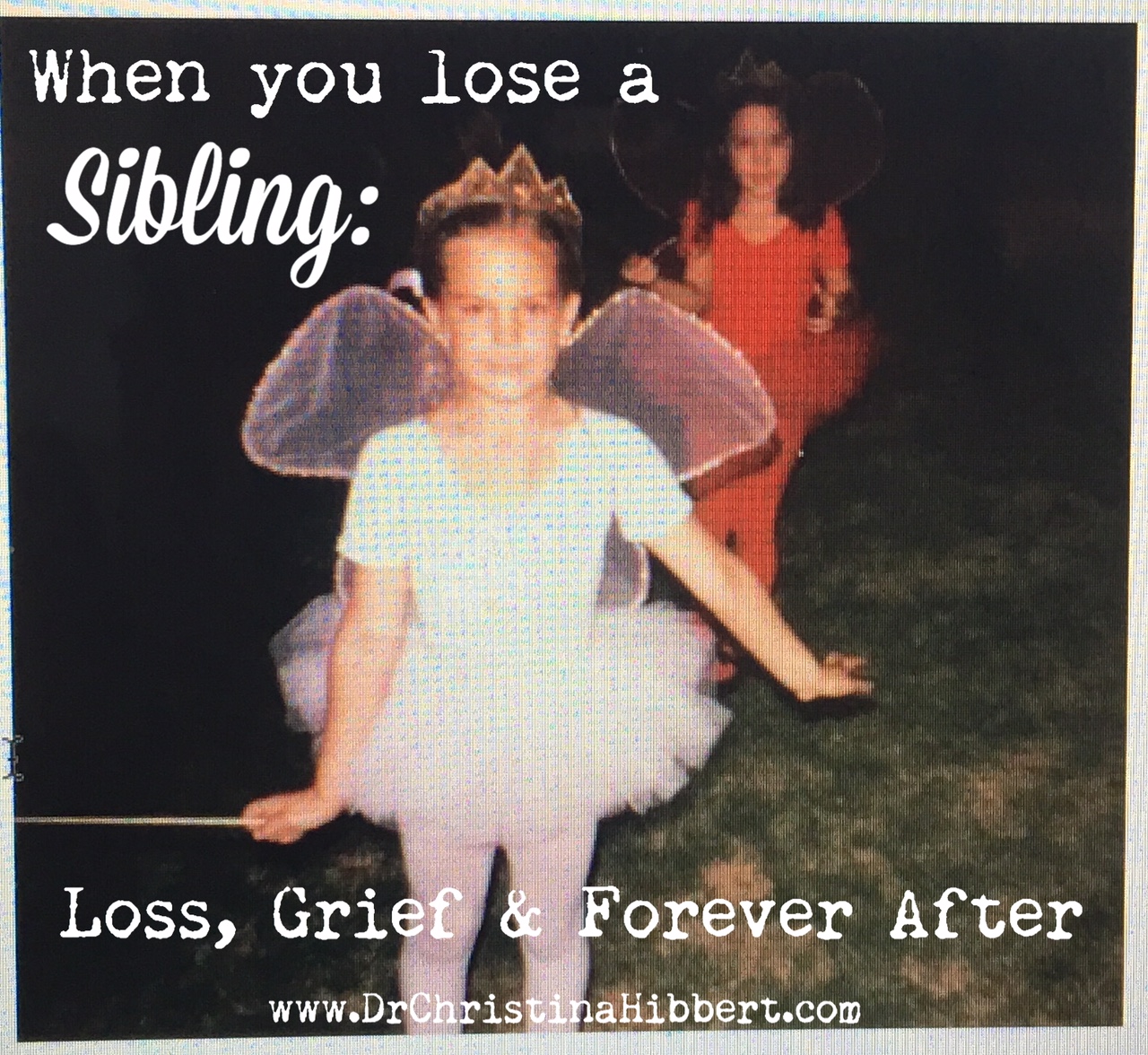
25 Oct When You Lose a Sibling: Loss, Grief & Forever After [video]
Last week was 10 years since my sister, Shannon, died. It’s hard to believe it’s been that long. It’s hard to believe it wasn’t just yesterday that she vanished from my life. Time is odd when you’ve lost someone you love.
I remember right after she died thinking, “If I can just let myself grieve through the first year, then I can move on.” How wrong I was. I know the only way to get “over” grief is to go through it, and I tried to push myself right into it. But, because of how she died, and because my brother-in-law had died just before her, and because we inherited our dear nephews who are now our sons, and because I had a baby just 4 weeks to the day that she died, and because we ended up in legal battles with extended family members a few months later, and because we had to create a whole new family when she died, the first year was just survival mode. How could have been anything else?
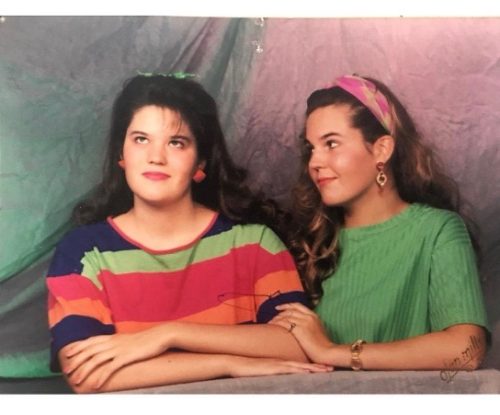
Shannon and I in my senior photos, recreating our favorite pic of us from our childhood (teenager style). See the original below. (Love the 90’s vibe!)
And so, on that October 17, 2008 anniversary, one year after she died, I found, to my surprise, my own grief process was just beginning. Of course it was! She was my sister! My best friend. The one I grew up with, the one I got married with, the one who married my husband’s best friend, the ones we were having babies with, our best friends. Now, she was gone. They were both gone. Their family was gone, and mine was brand new. And she was no longer there by my side. Of course I was just beginning to grieve.
When a sibling dies…
“When you lose a sibling, you lose the past and the future.” I still cling to that, because it’s true, and because it gives me comfort that my grief is valid. It’s real. It’s lasting. It’s because I love my sister.
I loved my youngest sister, McLean (Miki), too. She died at age 8 of cancer of the kidneys. I was 18. Her death introduced me to deep loss and grief. It introduced me to that now-familiar ache of knowing they’re really no longer there. It introduced me to the physical symptoms that can come from grief, like irritable bowel syndrome, toothaches from grinding my teeth, back and shoulder pain, headaches, insomnia. It introduced me to depression, and grief counseling at the BYU counseling center–because I was a psych major, I was away from home on my own, and I was at least old enough to understand I couldn’t make it through the crashing waves of grief alone.
Yes, losing Miki was my introduction to the reality of life–that we all die, even the good ones, even children, even when we pray and plead and wish it weren’t so. We all die. Our family members die. Our parents, of course, but our siblings, as well. Young siblings. Too young siblings. Always too young.
How they die…and how we grieve
Grief is a complex monster that can take many forms and can last ages longer than we ever expected, especially when we deeply loved our sibling. There are over 100 symptoms of grief, and we each experience these symptoms in unique and personal ways. How our sibling dies– how sudden it was, and the manner, circumstances, and consequences of their death–can impact our experience of their loss, and our grief, as well.
The experience of losing Miki was different than losing Shannon, for many reasons.
First, because of how she died. Sad as it was, we had some time to prepare, or at least to try and understand that she was really sick, and on chemo, and in and out of the hospital, and even her surgeries prepared us, because her odds of survival weren’t fantastic even from the start. Though we hoped she would live (and I’d say, we believed she might) we still had that small voice whispering, “She might not.”
Shannon, on the other hand, died shockingly, traumatically, in her bed in the night, because of a tragic mistake she made when she was drunk. We found out when the police called my mother to Shannon’s house and wouldn’t tell her what had happened until she was there. I found out from my mother’s sister, a call to my cell phone, while driving down to meet Shannon for lunch before teaching a 2-day postpartum depression training, while 8 months pregnant. Traumatic, shocking, and worst? Her two children she left behind.
That’s the second way the deaths differed, and thus the grief has differed–the consequences. For me, the consequences of Shannon’s death were so much grander in the worst possible way. For all of us, the consequences of her death were huge–for her children, and for mine, and for my parents and other siblings, and for my husband’s parents and my brother-in-law’s parents, and for everyone we knew. It was all so terribly sad and unbelievable.
When Miki died, it was sad and unbelievable, too–because she was a child. 8 years old. That is a tragedy, too, and we have grieved and mourned her ever since. But she went with incredible grace and she was prepared as much as an 8 year old could have been, to be with God again, and I know she is. She was just “she,” thank goodness. There were no major consequences of her death other than the obvious–losing our sweet, precious baby sister.
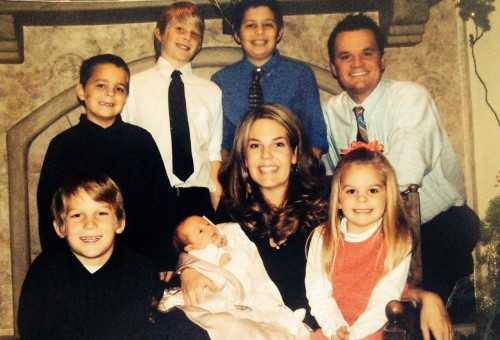
Just weeks after our family went from three to six kids, I posed us for a Christmas card pic. Can you see the fear in my eyes as I pulled myself together to be the mom everyone needed me to be?
Third, how old I was when my siblings died. I was younger when Miki died, and that made it feel very hard to deal with at the time. I didn’t know grief in such a deep way yet. My grandfather had died when I was 10, and that was hard, but in a different way, because he didn’t live with us, and I didn’t spend as much time with him, and even though he was younger than 60 when he died, he was “old” to me, and I knew grandparents died. I understood his dying to cancer easier than I understood Miki’s. When Miki died it taught me there are no rules. There’s no rule that says a child can’t die, that says you can’t lose someone else after you’ve lost one loved one. Yet I thought that for years after Miki died–that we couldn’t take another significant loss, so we were in some way “protected” from anything more. But then Shannon and Rob died, and I learned the awful truth–none of us is protected.
Watch “Understanding Sibling Loss & Grief: 3 Minute Therapy” on my YouTube channel.
Even though it was painful to deal with and understand Miki’s death at the age of 18, I was also protected by my youth. I didn’t know what I didn’t know. I hadn’t had all the painful life experiences I’d had when Shannon died, and that made my grief somewhat simpler, looking back. Being 32 when Shannon died meant I now had children who were affected by the loss. It meant I’d lived so many more years with Shannon, who was only 16 months younger than I and whom I’d experienced ALL of life with, and thought I would grow old with. I’d already suffered through postpartum depression and anxiety with my first 3 children, and had already been through consequences of Miki’s death on our family of origin–how losing her changed the trajectory of our entire family, of every person’s life, for better or for worse. All of this made Shannon’s death and the grief I have experienced so much deeper and lasting.
Your grief matters!
When a sibling dies, it can feel like our grief is not as important as others’.
I remember feeling like even Shannon’s other close friends’ grief was more “valid” than mine. When Miki died, I felt like I had to take care of everyone else, like I had to be the parent for my younger siblings now, and I was, in many ways, after college–cooking and cleaning for them, helping my siblings with homework and problems. My parents were just trying to deal with the loss of their baby girl the best they knew how, and I felt a need to be responsible for the other kids and help out as much as I could. When Shannon died, I literally took her life over, and I felt like I needed to handle everything possible for my parents and other siblings and especially for my children, of which I now had 6. And I did. For a long time. And then I crashed in grief even harder.
The truth is, if you have lost a sibling, your grief matters! It matters at the start. It matters all along the way. It matters forever! You loved your sister or brother. You miss them, and you will always miss them. You will forever think of them and remember them and wish they were there with you. And that doesn’t take anything away from anyone else’s grief. Your parents will grieve them in their own way. Other siblings or family or friends will grieve them in their way. You must grieve them in your own way.
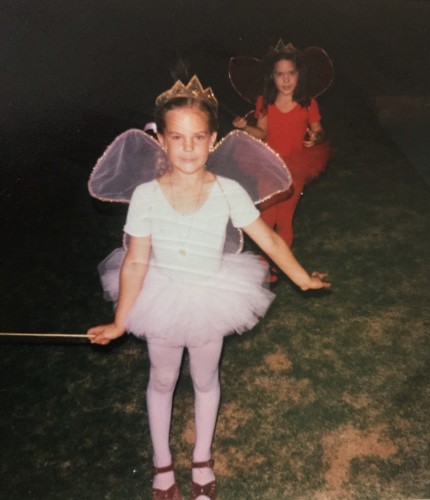
Me (front) and Shannon (behind), as fairies for Halloween. She always followed and had my back. Now it’s just me.
Grief is a sign of love…forever
Why does the grief for your sibling seem to come and go? That’s the way grief works for someone who was supposed to be a part of your life until you are old and gone. Just because you’ve worked through your grief (and again, it must be worked through), doesn’t mean you won’t experience it here and there, randomly and on anniversaries, when life moments happen and you wish they were there, and even when you wake up some days and you just feel heavy again. Yes, it will get better. But it won’t ever go away completely. The body remembers. Your heart remembers.
I have shared much more of my personal feelings about siblings and loss than I expected to when I sat down to write this today. It just poured out of me. I think it’s a perfect example of what I’m saying–that we will always remember and miss our siblings. We will forever be changed by their passing. We will forever need to talk about them and share their stories, and ours, for we have a hole inside where they once lived.
That doesn’t mean we can’t feel whole again. It’s just a new whole. A whole with a hole. And that hole is there to remind us, to bring us back to them time and again, to wish they were with us, cry for them once more, imagine what it would be like if they were here, to honor them by our actions and words, and to love others more fiercely because we once loved them, and will forevermore. Because they are our siblings.
I’d love to hear about you and your sibling. Please leave us a comment, thought, remembrance, or whatever you like, below.
Watch “How long does grief last?” and read my blog post that goes along with it, here.


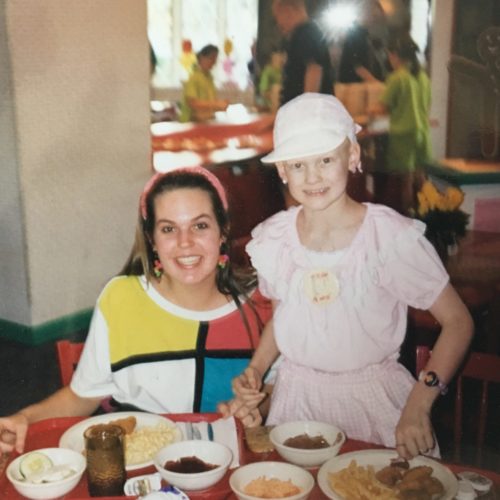
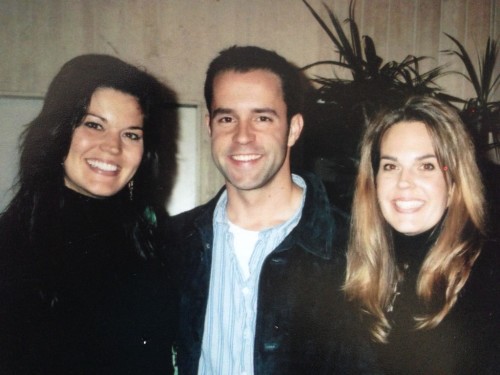
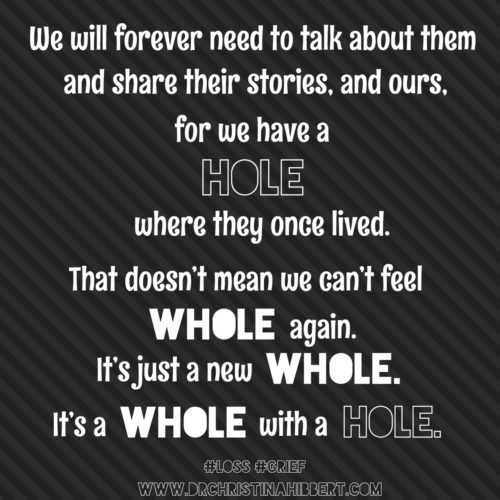
Thank you for sharing your story on sibling grief. So many things you said touched me. My sister was murdered 17 years ago, though it feels like yesterday- it has been difficult but I recently started sharing my story on a blog and hope to honor her and help others who may be grieving.
I am deeply sorry to hear of the tragic loss of your sister. I am grateful you are feeling ready to share your story and honor her. So many are searching for support after losing a sibling, and I know you will be a great help.
I lost my dear Brother just 7 days ago on the 19th Dec, he had been suffering with alcoholism for the past 10 years and had started having fits, sadly his heart just gave out. I was hard on my Brother and feel terrible guilt that i should have done more to help him. His Christmas gifts are still sitting under my tree and it breaks my heart knowing i will never get the chance to give them to him. My emotions change each day from anger, sadness and deep grieving. Your videos have helped me enormously, Thank You.
I am so sorry for your terrible loss. It’s especially difficult when it’s so sudden, I know. That guilt can be heavy, and I hope you know you are not to blame, though I know how it can feel to wonder, “What if I’d just…?”. Anger, sadness, acceptance, and back to denial and bargaining again–that is grief. All of it. Sometimes you feel it all in an hour, or a day, or a week. It’s a long healing process, and I’m grateful you’re letting yourself FEEL, because that is the only way to truly, eventually heal. Thank you for the kind words and for sharing what you’re going through. Again, I’m so terribly sorry you have to go through it. Sending love and healing prayers to you.
I lost my brother in August 4th. He was only 52. I just turned 50 this year. He had been sick for a while and passed away in his sleep. He was at home with his wife and kids. I love a few minutes away and I was never told he was as sick as he was. I was told he wasn’t breathing ran over and was told by the medics that he was gone, most likely within the last hour. I have been devastated since then. I feel like my feelings of loss and pain are not valid because he was married to my sister in law and he had kids. Like their pain is more important than mine. And my parents pain is more important. I am not married and no kids and don’t really have a support system and when I try and discuss with other people they make me feel like I should just concentrate on his widow and kids and that I’ll get over his loss. We lived over seas as kids and only had each other. That’s all I can think of. I thought he was going to be around till we were older and also to help with my mom who had dementia. But he’s not. He is gone and I feel lost and alone.
I am so very sorry for this terrible and traumatic loss of your dear brother. So many aspects of this make it extra painful, including not knowing he was unwell, the shock of suddenly losing him, and feeling like your grief isn’t as important as others’. Traumatic death adds that extra complexity of not only grief but trauma, and it can take a long time and a lot of trauma work to heal. It’s also been such a short time. Of course you feel all these things. We never expect our siblings to die. WE’re supposed to grow old with them. I know this feeling so well.
Let me just say: Your grief is as valid as anyone’s. You were closest to him your whole life long, and likely he to you. Sibling loss is not acknowledged, it’s not understood, and it’s surely not validated like it should be, and I’m so sorry you are experiencing this. You are absolutely not alone in how you feel. It’s real. It’s traumatic. It’s not only ok to grieve as long as you need; it’s healthy to do so. It’s a sign of your deep love for your dear brother.
Warmly,
Christina
Katherine, I am so sorry to hear of the loss of your dear brother. I understand everything you said here about not feeling your loss is valid because others’ losses feel “bigger” or “more important” to the world. Let me just reiterate: Your loss is valid, huge, real, and matters. You’ve lost more than others in many ways, having known him your whole life. Like you said, you thought you’d be together your whole life. That’s an unbearable loss, and I understand and you are not alone. I wish I could give you a big hug and hear all about your dear brother. Just know what you feel is normal, and it’s painful, and it’s a loss that will carry on your whole life, even if it eases some with time. xo